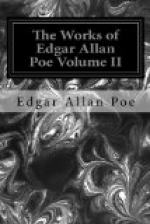It was during one of these reveries or pauses of apparent abstraction, that, in turning over a page of the poet and scholar Politian’s beautiful tragedy “The Orfeo,” (the first native Italian tragedy,) which lay near me upon an ottoman, I discovered a passage underlined in pencil. It was a passage towards the end of the third act — a passage of the most heart-stirring excitement — a passage which, although tainted with impurity, no man shall read without a thrill of novel emotion — no woman without a sigh. The whole page was blotted with fresh tears; and, upon the opposite interleaf, were the following English lines, written in a hand so very different from the peculiar characters of my acquaintance, that I had some difficulty in recognising it as his own: —
Thou wast that all to
me, love,
For
which my soul did pine —
A green isle in the
sea, love,
A
fountain and a shrine,
All wreathed with fairy
fruits and flowers;
And
all the flowers were mine.
Ah, dream too bright
to last!
Ah,
starry Hope, that didst arise
But to be overcast!
A
voice from out the Future cries,
“Onward! " —
but o’er the Past
(Dim
gulf! ) my spirit hovering lies,
Mute — motionless
— aghast!
For alas! alas! with
me
The
light of life is o’er.
“No more —
no more — no more,”
(Such language holds
the solemn sea
To
the sands upon the shore,)
Shall bloom the thunder-blasted
tree,
Or
the stricken eagle soar!
Now all my hours are
trances;
And
all my nightly dreams
Are where the dark eye
glances,
And
where thy footstep gleams,
In what ethereal dances,
By
what Italian streams.
Alas! for that accursed
time
They
bore thee o’er the billow,
From Love to titled
age and crime,
And
an unholy pillow! —
From me, and from our
misty clime,
Where
weeps the silver willow!
That these lines were written in
English — a language with which I
had not believed their author acquainted — afforded
me little matter for surprise. I was too well
aware of the extent of his acquirements, and of the
singular pleasure he took in concealing them from
observation, to be astonished at any similar discovery;
but the place of date, I must confess, occasioned
me no little amazement. It had been originally
written London, and afterwards carefully overscored
— not, however, so effectually as to conceal
the word from a scrutinizing eye. I say, this
occasioned me no little amazement; for I well remember
that, in a former conversation with a friend, I particularly
inquired if he had at any time met in London the Marchesa
di Mentoni, (who for some years previous to her marriage
had resided in that city,) when his answer, if I mistake
not, gave me to understand that he had never visited
the metropolis of Great Britain. I might as
well here mention, that I have more than once heard,
(without, of course, giving credit to a report involving
so many improbabilities,) that the person of whom
I speak, was not only by birth, but in education,
an Englishman.




